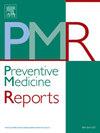Food parenting stress among caregivers receiving government food assistance: a study from the United States
IF 2.4
3区 医学
Q2 PUBLIC, ENVIRONMENTAL & OCCUPATIONAL HEALTH
引用次数: 0
Abstract
Objective
Caregivers are expected to implement child feeding recommendations such as providing healthy meals and promoting family meals. However, these expectations may contribute to stress, particularly for families without food security. This study examined food parenting stress and its variation by household food security.
Methods
Baseline data, from Rhode Island and Connecticut (May–September 2023) from an ongoing study assessing the impact of a state-wide incentive program for Supplemental Nutrition Assistance Program participants, were used. Primary caregivers completed an online survey, with socio-demographic questions, household food security, and a Likert-type-scale assessing feeding stressors. Associations between stressors and food security were analyzed using chi-square-tests and multivariable logistic regression.
Results
Among 779 respondents, nearly half of respondents reported that making sure their child eats the right amount of food (46 %), the right kind of food (49 %), and healthy food outside the home (50 %) was ‘moderately’, ‘very’, or ‘extremely’ stressful. Households that did not experience food security had significantly higher odds of reporting stress across all feeding situations vs. those with food security, adjusting for covariates.
Conclusions
Food parenting stress is common and heightened among those that are not food secure. Nutrition education should be paired with supports that address structural barriers.
接受政府食品援助的看护者的食物养育压力:来自美国的一项研究
目的儿童喂养机构应落实提供健康膳食和促进家庭膳食等儿童喂养建议。然而,这些期望可能会造成压力,特别是对于没有粮食保障的家庭。本研究考察了食物养育压力及其随家庭食物安全的变化。方法基线数据来自罗德岛州和康涅狄格州(2023年5月至9月)的一项正在进行的研究,该研究评估了全州范围内对补充营养援助计划参与者的激励计划的影响。主要照顾者完成了一项在线调查,其中包括社会人口统计问题、家庭食品安全以及评估喂养压力源的李克特量表。采用卡方检验和多变量logistic回归分析应激源与食品安全之间的关系。结果在779名受访者中,近一半的受访者表示,确保孩子在家外吃适量的食物(46%)、正确的食物种类(49%)和健康的食物(50%)是“中等”、“非常”或“极度”的压力。根据协变量进行调整后,没有粮食保障的家庭在所有喂养情况下报告压力的几率明显高于有粮食保障的家庭。结论:食物父母压力在食物不安全的家庭中很常见,而且会加剧。营养教育应与解决结构性障碍的支持相结合。
本文章由计算机程序翻译,如有差异,请以英文原文为准。
求助全文
约1分钟内获得全文
求助全文
来源期刊

Preventive Medicine Reports
Medicine-Public Health, Environmental and Occupational Health
CiteScore
3.90
自引率
0.00%
发文量
353
 求助内容:
求助内容: 应助结果提醒方式:
应助结果提醒方式:


